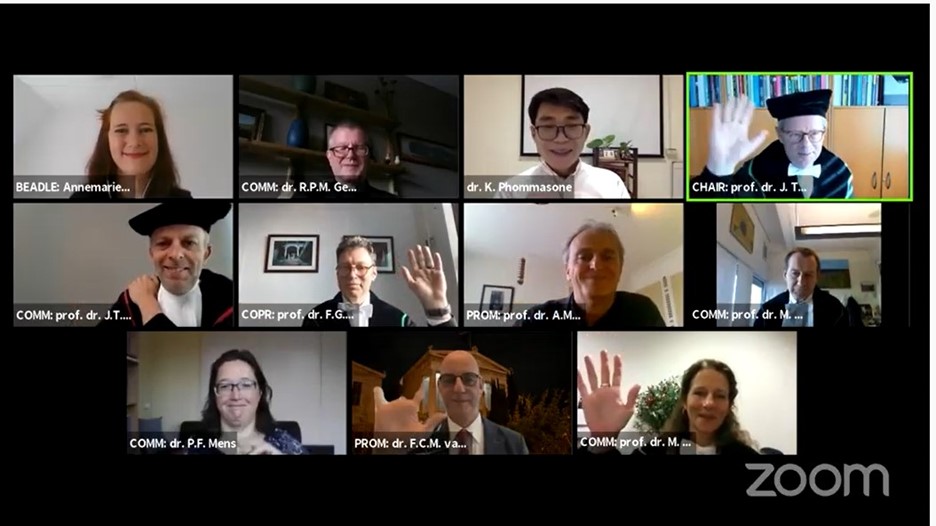
30 Oct Koukeo Phommasone Completes his Doctoral Degree After Successful PhD Defense
Koukeo was already a research physician in Laos when a multi-country project crossed his path in 2015 which, became the subject of his PhD thesis entitled: “Studies to provide recommendations on the pre-elimination of Plasmodium vivax in Laos PDR”.
Dr. Koukeo successfully defended his PhD on 28 October 2020 over Zoom. With this most recent accomplishment, his friends now joke that he should be called “Dr. Dr. Koukeo”. The fruits of his research may contribute to solving a public health threat in many countries, but “there still is lots of research to be done, at larger scales and including all other factors involved”. Koukeo published three papers as first author during his research and co-authored multiple others.
Malaria remains a major public health problem in the Greater Mekong subregion and progress in malaria control and elimination has stalled over the last few years coinciding with the emergence of multi-antimalarial drug-resistant Plasmodium falciparum. Elimination of these resistant parasites from this region is a top priority to prevent the spread to Africa where malaria is the most prevalent. To address this problem, a randomized controlled trial was conducted in 16 villages in Myanmar, Vietnam, Cambodia, and Laos to assess the effectiveness of mass drug administration (MDA) on Plasmodium falciparum elimination. MDA, which refers to administering treatment to the whole population in target areas, irrespective of symptomatology or diagnostic test results, has been reconsidered as an additional tool to accelerate malaria elimination by clearing both symptomatic and asymptomatic malaria reservoirs and thus stop the spread of antimalarial resistant parasites.
Dr. Koukeo spent the first two years of his PhD program to run this study in southern Laos, in four villages of Nong district which were chosen based on high prevalence of asymptomatic Plasmodium falciparum infections. Two villages were randomized to receive MDA and two served as controls. He found that MDA was safe, feasible and accepted by the community in the Laos context with high community participation and led to a significant reduction of asymptomatic Plasmodium falciparum infections for at least one year of follow-up. He also pooled data from all four countries to assess the impact of MDA on Plasmodium vivax infections. Plasmodium vivax is the second most prevalent malaria parasite and can stay dormant in the liver to cause repeated infections. As expected, after MDA without radical treatment for Plasmodium vivax, there was a rebound of Plasmodium vivax infection after 6 months. Radical cure with primaquine is required to eliminate these dormant parasites but this medication is not widely used due to fear of hemolytic anemias caused by this medication in some patients. Dr. Koukeo also assessed radical cure of Plasmodium vivax, which was found to be safe, well-tolerated and prevented relapses.
As part of his PhD adventure, Koukeo experienced living in a poor rural community in his own country where the living conditions are completely different from Vientiane, the capital of Laos where he currently lives. He found this study to be very challenging as he and his team had to conduct intensive community engagement activities during days and evenings to engage healthy people to participate in MDA and blood draws. It took 6 months to make people understand the concept of asymptomatic malaria and rationale of MDA.
His doctorate journey taught him what it is like to lead a group of people and he is thankful for his supervision; Dr. Frank van Leth, his promoter, who helped him master statistical skills during his visits to the AIGHD offices in Amsterdam, his co-promoter Dr. M. Mayxay from Laos, co-promoter Prof. Frank Cobelens and of course his promoter Dr. Arjen Dondorp from University of Oxford.
What is next for Dr. Dr. Koukeo?
“Research is not over” as Koukeo plans to finish writing-up two research projects. He is determined to pursue supervising studies as a principal investigator in Laos.
AIGHD wishes Koukeo the best of luck in his future research career.
